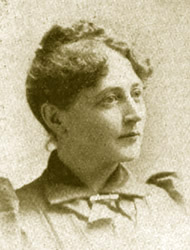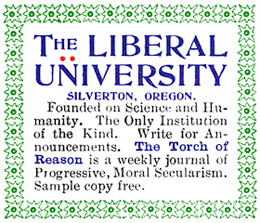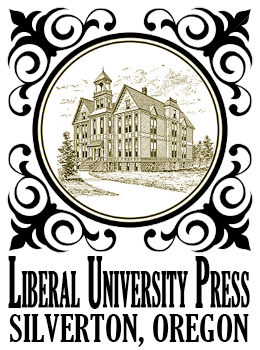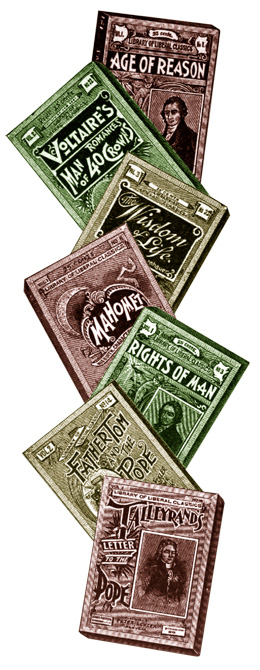By Marie Harrold Garrison — October, 1900
 A whole year passed in the country causes one to consider seriously in more phases than one the subjects of grain-raising and of weed-growing. “Every human life is a field under more or less cultivation,” says the “last-day” composition of a sweet girl graduate. Trite as the sentence is, it starts one’s thoughts to turning over facts. One blushes to think of the statistics that a census taker of “weeds” would be able to exhibit of our own fields.
A whole year passed in the country causes one to consider seriously in more phases than one the subjects of grain-raising and of weed-growing. “Every human life is a field under more or less cultivation,” says the “last-day” composition of a sweet girl graduate. Trite as the sentence is, it starts one’s thoughts to turning over facts. One blushes to think of the statistics that a census taker of “weeds” would be able to exhibit of our own fields.
Ah, who shall take the census of untended fields? Who can number the weeds of the world? Who is willing and able to attack them with hoe and knife and pick and plow? I notice farmers use the plow not alone for cultivating the corn and wheat, but for “ripping up” the very roots of weeds where they are matted and netted together across a field. The farmers say, “The weeds are turned under,” for, as the sturdy horses draw the plow the heavy, bright steel bears down into the earth, and its curved form cuts and hauls outward the roots while the tops turn side-wise down. “Turned under” is a strong expression and one often used in connection with more matters than farming, and, do you know, when I inspect the various Liberal journals that come to me, I liken some of them to plows that are vigorously “turning under” the rankest weeds of superstition while some of them seem to be not plows but planters—planters of new grain: then again there are others that seem to combine the plow and planter. To-day, as I glance through the June number of the Free Thought Magazine, I seem to have a realizing sense of the importance of the work and of the serious and sacred aspect of the undertaking. Only by right methods will truth prevail. Only by enlightened methods in which education and refinement largely predominate can our cause of Free Thought, of Liberalism, stand steadily or advance successfully.
Clear wit and often cleanly-worded ridicule are as effective in cutting down the mental distortions growing in places where orthodox work abounds as are sharp hocs effective in cutting off and uprooting weeds in the common field of mother earth.
When classifying the “weeds” of the natural and moral world, we should avoid the error of giving them all the name of “superstition.” There are weeds of bigotry and of caste outside the fields orthodox. This is an age in which unorthodox churches are fast multiplying. Churches in which poetic-idealism has supplanted the old superstition. When we fail to realize this we simply blunder to the injury of ourselves and we place ourselves in the shoes of the old farmer I once knew (and, indeed, I know to-day several), who cut down the most graceful elm in his yard and uprooted every flower his wife and daughter planted. He claimed that the flowers could not be put into the dinner-pot and boiled as could cabbage, and he scoffed at people who claimed that the elm of two centuries’ growth was worth preserving for beauty’s sake; he scoffed and said: “Ther’ air only tew things trees is fit fur-one thing is tew chop up fer fire-wood, an’ t’other thing is tew split up fer rail fences.” Now, I hold that while there are a vast number of “weeds” growing up and endangering the grain crops of Sanity and of Science, there are “elms,” too, that were planted by mankind even in Bible times, and there are flowers of poetic expression and vines of imagination that we should not confound with the “poison-vines” of harmful-creeds, and of stupid “dead-letter” observances.
To kill imagination and poetry is to kill trees and flowers. Though the Bibles be swept away Idealism must still exist. There are many Freethinkers and Agnostics who realize this, and among them it 1s safe to count the broad-minded, far-seeing people, both of the established churches and of the great out-of-church world.
The matter of idealism comes up with force to me at this hour because of seeing the announcement of the founding of an Agnostic church in Chicago; a church whose pastor or leader or instructor is Dr. T. B. Gregory, whose article, “Rational Worship,” in this June number of your magazine I have read attentively and with profit and pleasure. for I gather the impression that the Agnostic church is setting out with the intention of growing, and surely there is no better gospel in the world than that expressed by the simple phrase: “Let us grow.” Such a church will be in startling contrast to the churches whose main end and aim is “Let us crow.”
I wish Dr. Gregory all success in his undertaking; at me same time I have a feeling that the name Agnostic may prove a misnomer in this case, unless the terms “Agnostic” and “Rational” can be made to appear synonymous.
In this very address Dr. Gregory gives on page 313 a rational, refined and logical definition of that circumambient idea that the majority of mankind make an attempt to reduce to the limits of the three-letter word G-O-D god. In fact, Dr. Gregory proves that he actually knows something about the subject. So far so good, but now mark the definition given by best lexicons of the term Agnostic is, “One of a class of thinkers who disclaim any knowledge of God or of the ultimate nature of things” (Century Die).
After reading Dr. Gregory’s address, “Rational Worship,” I must insist that the interesting gentleman cannot “read his title clear” to the appellation Agnostic.
I often feel vexed at Mr. Huxley for having invented the word Agnostic, it is such a shield for “dodgers,” and I notice that the men who dodge behind it are the very ones who really have arrived at the safest, most logical conclusions, and can give the clearest definitions of things. I take it that Dr. Gregory and George Jacob Holyoake belong in the same category, and what we ordinary folk need to do is to corner them right in and “make them tell,” as children say.
Among densely ignorant people and such people as “think with their fists,” the word God stands for a great fetish and a mighty “hoodoo,” but why the intelligent should say, “God is something about which we know nothing,” is more than I can determine. Such a pretense is equivalent to saying: We know nothing about the principles and ideas represented by the words “instinct,” “knowledge,” “environments,” “universe,” “cosmos,” “chaos,” “good,” “bad,” “virtue,” “vice,” “benevolence,” “charity,” “chastity,” for portions of all these things have over and over again for thousands of years been proven to constitute the ever-changing and ·bettering ideal that the world of human beings calls God. Ideal spelled with a capital would be a more appropriate name than God. (This, I take it, is also Dr. Gregory’s view.)
Because the idea-god has root in the human brain, it is by the brain knowable to a greater or less extent, therefore no intelligent human has any moral right to claim no knowledge concerning “God,” and it logically follows that the brains of greatest acumen know the most on the subject.
The name God being used to represent not only idealism in the mental and moral life of mankind, but also the first Cause of all physical life, an essence still at work in the visible universe, I must assert that such men as Darwin and Huxley and Wallace and Spencer, and their ilk, are not agnostics, though modesty caused Mr. Huxley to invent the name and apply it to himself.
The misuse of words, names and ideas, and more than all the abuse of them, bring them into contempt. The misuse and abuse of the word God by religious people, and markedly by superstitious people, has brought it into contempt. On the other hand, the non-church people may bring the name Agnostic into contempt.
The God-idea is certainly graspable just as much as the Santa Claus idea is graspable, therefore no intelligent individual who knows by experience and records of experience, what benevolence and parental love mean has any moral right to say, “As to Santa Claus, I know nothing about him,” or to say, “As to the mischievous Bogies and Pixies, I am agnostic.” They have no right to say so, because in intelligent maturity they know more about these imaginary beings that represent portions of ideas and general virtues or vices than do the children who actually believe in Santa Claus as a gift-making Being, and Bogies as punishment dealing beings. Any one understanding the principle, the virtue, the human attribute that gave rise to Santa Claus, knows about Santa Claus, and toward the said named ideal of imaginary personification cannot be agnostic, and should not claim to be.
Sanity, of course, forbids that after we have reached certain years of judgment we shall continue representing benevolence by the name “Santa Claus,” and for a like reason sanity, science, intelligence, love and highest idealism forbid natures that have attained to certain stages of development making use of the three-letter name God. The name is inadequate.
The personification of abstract ideas and of boundless essences leads inevitably to idolatry, bigotry, superstition. The very personification that were once the strength of the Bible are now its destroyers. The intelligent world has passed the childhood days when Santa Claus, however spelled, is believed in. The death of the God-personification, however, will not argue the death of the universe nor the discontinuance of goodness, love, charity, education, chastity or other expressions of truth and necessarily of being; on the contrary, these things will grow just in proportion as the God personification dies.





